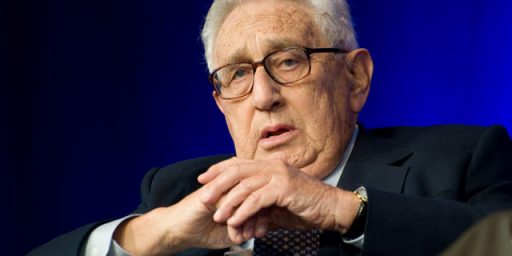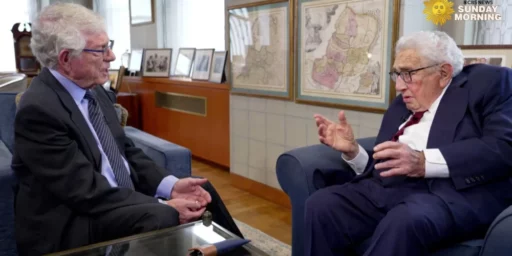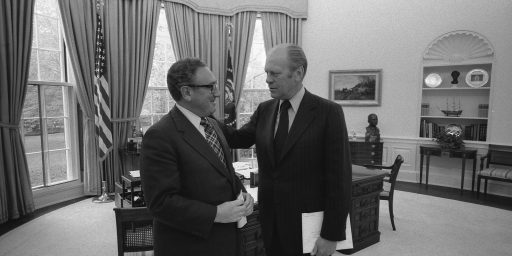US-European Relations After Bush
Henry Kissinger‘s column today makes some important observations about three major trends in international relations that will shape the debate in coming decades. There’s not much I can add to his analysis but I wanted to draw especial attention to this observation:
Conventional wisdom holds that disenchantment with President Bush’s alleged unilateralism is at the heart of European-American disagreements. But it will become apparent soon after the change of administrations that the principal difference between the two sides of the Atlantic is that America is still a traditional nation-state whose people respond to calls for sacrifices on behalf of a much wider definition of the national interest than Europe’s definition.
Although I’m not sure Americans are much interested in sacrifice these days, either, Kissinger’s right that there are fundamental attitudinal differences between the United States and “Old Europe”* that won’t go away with the Bush administration. We do indeed share with the Brits a more global sense of our national interests and are less reluctant to both use military power but, more importantly, spend our treasure maintaining a substantial expeditionary capability.
Nor, incidentally, are US-European relations as bad as conventional wisdom would have it. Aside from the dispute over the war in Iraq, the issues which divide us are overstated and our commonality of interests vastly understated. At the NATO summit in Bucharest last week, there was widespread consensus on most issues, notably going forward with missile defense and eastward expansion of the Alliance. President Bush was rebuffed on membership action plans for Ukraine and Georgia but this was an issue that split Old Europe as well; and even there, the members agreed that those countries would be admitted at some unspecified date, with the issue to be revisited in December.
__________
*Note: I don’t use this term derisively. Whatever Don Rumsfeld’s intentions with that coinage, it’s a very useful shorthand for distinguishing the traditional Western European states from the emerging democracies further east.






It will be nice going to Europe without people giving you dirty looks (and that’s from our friends).
If having another Democrat in the WH is the price to be paid for avoiding dirty looks from the socialists in the EU, the dirty looks are by far preferable.
I agree with this, James, but I think that it should be emphasized that the overstatements and understatements are on both sides of the Atlantic. That having been said I think there are real differences, too, that neither most Europeans nor most Americans probably appreciate. Politically, the U. S. is an outlier. Our mainstream politics ends nearly where French mainstream politics begins.
My own view is that both sides of the Atlantic need to agree to disagree. They’re entitled to their opinions and systems and we’re entitled to ours and I have no more reason to believe that we’d be happy under the accommodations that they’re satisfied with than I am that they’d be happy with ours. Live and let live.
However, I’ve been arguing for probably the last seven years that any notion that a new president will heal all ills is, in Sam Clemens’s words, an exaggeration. Our European cousins have been mistrusting and looking down on us for the last 200 years or more and I doubt that a change of administration will change their minds.
Although I’m not sure Americans are much interested in sacrifice these days.
Oh, I think Americans are interested in sacrifice. It’s just that most of us are interested in letting someone else, or someone else’s kid, make the sacrifice.
Personal sacrifice? No, I don’t think so.
Fighting the war? No, not really.
Paying for the war? Forget it.
I think Dave Schuler has it right. A new president will not change the fundamental differences between Europe and the United States. It’s more than the war, more than foreign policy differences, it’s a difference in attitudes about who we are in the world.
I watched a recent program about developing a new racing motorcycle and was struck about what one of the Italian designers said. He spoke of Americans not being programed to fail. What he meant was we see the sky as the limit and are not limited by class structure while Europeans still hold class distinctions and the idea you should never aspire to be more than you are born. That concept has no place in American thinking and we are judged arrogant for not recognizing it. That perceived arrogance is a good part of why Europeans dislike us yet also envy us.
We can’t undo the last hundred years of American power and prestige that led to this envy. We can’t undo our economic progress that made us the envy of the world. We can never stop thinking like Americans who ignore class lines and teach our children they can do anything and be anybody they want. Our optimism will always be somewhat irritating to some.
Well, you’re BOTH right, so far as you each go. What yo’re missing, here is what explains the brittle-ness of the exchanges; The Euopians are seeking to supplant the US as the dominant force in world politics, and in world culture. What did you think the EU was, simply a monetary arrangement?